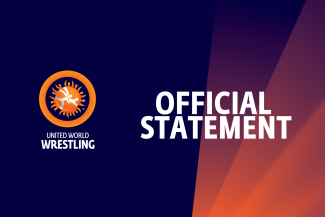Iran Wins Greco-Roman Team Title, Komarov Wins Fourth World Gold
Wednesday, September 19, 2018 - 20:48 By Eric Olanowski
TRNAVA, Slovakia (September 19) – Iran, with four gold medalists and 136 points wrapped up the Greco-Roman team title at the 2018 Trnava Junior World Championships, four points ahead of second-place Russia.
Amin KAVIYANINEJAD (IRI), with his left shoulder heavily taped, claimed back-to-back junior titles, making it his third overall age-level world championship.
In the 72kg championship bout, Kaviyaninejad scored an early takedown and transitioned into a gut wrench to command the 4-0 lead over Georgia’s Nikoloz TCHIKAIDZE. The Iranian wrestler slipped and surrendered his first takedown of the tournament, cutting his lead to 4-2.
The three-time age-level world champion dominated the remainder of the bout, scoring two four-point throws, ending the match with a high dive to a body lock to pick up the fall.
Kaviyaninejad joined fellow countryman Amin MIRZAZADEH (IRI) (130kg), Pouya NASERPOUR (IRI) (55kg), and Mohammadhadi SARAVI (IRI) (87kg) as Trnava junior world champions.
Meanwhile, Russia, led by Aleksandr KOMAROV (RUS) who earned his fourth age-level world title finished in second place with 131 points.
Komarov (RUS) shutout out Andrew BERREYESA (USA) 10-0 in the 77kg finals to reach the top of the junior world podium for the second straight year.
“These World Championships were the toughest yet. But it a great learning experience, and it feels good to win again,” said Komarov. “Now, my attention turns toward the senior-level and the 2020 Tokyo Olympic Games.”
Kerem KAMAL (TUR) was the third reigning champion to successfully defended his Tampere world title on Wednesday night.
Last year’s 55kg gold medalist stopped India from winning their first junior world gold medal since 1992, defeating Vijay VIJAY (IND), 10-0 in the 60kg gold-medal bout.
Kamal, who was wrestling in his fourth age-level world final backflipped his way to a gold medal with a pair of explosive four-point throws and a takedown.
After the match, Turkey’s two-time champion navigated his way to the mat-side camera and blew kisses to his fans that were not in attendance to enjoy the show he put on at the City Sports Hall here in Trnava, Slovakia.
Armenia’s Malkhas AMOYAN (ARM) and Arvi SAVOLAINEN (FIN) won the remaining pair of Greco-Roman gold medals.
Amoyan finished the 67kg gold-medal bout with a 10-0 technical superiority win over Uzbekistan’s Makhmud BAKHSHILLOEV, while Arvi Savolainen shutout Markus RAGGINGER (AUT), 5-0 for the 97kg gold medal.
RESULTS
Team Scores
GOLD - Iran - (136 points)
SILVER- Russia (131 points)
BRONZE - Armenia (83 points)
Fourth - Turkey (79 points)
Fifth - India (73 points)
60kg
GOLD - Kerem KAMAL (TUR) df. Vijay VIJAY (IND), 10-0
BRONZE - Kazuki YABE (JPN) df. Razvan ARNAUT (ROU), 2-1
BRONZE - Ali Reza Ayat Ollah NEJATI (IRI) df. Ihor KUROCHKIN (UKR), 9-0
67kg
GOLD - Malkhas AMOYAN (ARM) df. Makhmud BAKHSHILLOEV (UZB), 10-0
BRONZE - Yousef HOSSEINVAND FATHI (IRI) df. Mohamed Ibrahi ELSAYED (EGY), 11-5
BRONZE - Parviz NASIBOV (UKR) df. Ismail GUN (TUR), 3-3
72kg
GOLD – Amin KAVIYANINEJAD (IRI) df. Nikoloz TCHIKAIDZE (GEO), via fall
BRONZE - Erkan ERGEN (TUR) df. Minto MAEDA (JPN), 6-3
BRONZE - Magomed YARBILOV (RUS) df. Alijon KHUSEYNOV (UZB), 5-0
82kg
GOLD - Aleksandr KOMAROV (RUS) df. Andrew BERREYESA (USA), 10-0
BRONZE - Istvan TAKACS (HUN) df. Aivengo RIKADZE (GEO), 6-5
BRONZE - Muhutdin SARICICEK (TUR) df. Simone FIDELBO (ITA), 11-2
97kg
GOLD - Arvi Martin SAVOLAINEN (FIN) df. Markus RAGGINGER (AUT), 5-0
BRONZE - Artur SARGSIAN (RUS) df. Illia LAURYNOVICH (BLR)
BRONZE - Balint VATZI (HUN) df. Islam UMAYEV (KAZ), 4-0


Share your thoughts.
Comments